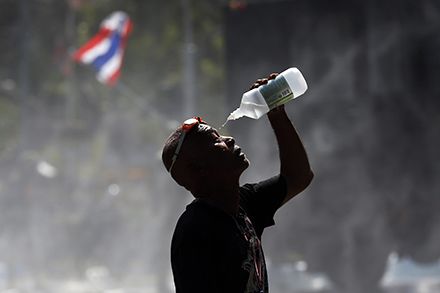Although Thailand seems to move from one political crisis to another, the Kingdom’s debt markets remain active

Trying times
Source: REUTERS/Damir Sagolj
An anti-government protester recovers from teargas during clashes with police at the barricade in front of the Government House in Bangkok.
Thailand’s corporate bond industry has an innate and confounding resilience to political disruption. Despite the Kingdom’s tendency to lurch from one political crisis to another, the bond markets have not missed a beat.
Political protestors storming the international airport and freezing all flights did not deter the market in 2008, and it has been business as usual in the last few months even as protestors tried to thwart Prime Minister Yingluck Shinawatra’s efforts to hold a general election on February 2.
Last month, about Bt22bn (US$688m) of corporate bonds were sold, an impressive amount given the turmoil in the streets.
Significantly, the Bank of Agriculture and Cooperatives also reopened a 2016 bond issue for Bt32.6bn last month. BAAC’s second try at selling the politically controversial three-year 3.53% bond was a good example of how much the market for Thai bonds has improved as the original offering last November garnered only half the bids the state bank had sought.
The funds are needed to support a politically sensitive rice scheme. Political opponents have slammed the controversial plan as a government ploy to buy support from farmers, and they have accused the current administration of draining capital from the country.
Just two months later, BAAC got a better response to its deal, thanks, in part, to the timing. Yields on Thai Government debt had dropped as investors fled from stocks into bonds amid concerns that the political unrest would lead to widespread violence, making the 3.14% yield on the BAAC reopening attractive.
“They are taking this opportunity to sell bonds and, with liquidity still ample, they can afford to ignore the higher political risks and uncertainties to focus on their funding plans.”
The strong investor response flies in the face of the escalating political tension in the Kingdom and fears that the economy is unstable.
A recent rout of emerging-market currencies had raised fears that Thailand would get pulled in, as well. So far, it has withstood the onslaught. Nevertheless, the prolonged political instability could hit Thailand’s economy. The government is now projecting growth this year will decelerate to 3.1% from last year’s estimate of 5.1%. However, foreign reserves remain stable at US$160bn.
Staying in focus
Thailand’s domestic bond market has always relied heavily on local investors, who tend to stay clear of politics. Indeed, in the aftermath of an inconclusive February 2 general election, investors at mutual funds, insurance companies and corporations continue to demand new supply.
The liquidity comes at a perfect time for issuers wanting to beat rising rates. Yet, Thai market participants project that the Bank of Thailand will implement a rate cut at its next meeting on March 12. The BoT kept its benchmark rate unchanged at 2.25% after its January 22 meeting to surprise the markets, which had projected a 25bp cut at that time.
“The companies are mostly concerned that the yield curve will rise, especially at the long-dated ends,” said one Thai debt syndicate banker.
“They are taking this opportunity to sell bonds and, with liquidity still ample, they can afford to ignore the higher political risks and uncertainties to focus on their funding plans.”
Major Thai companies are rushing to cash in on the appetite to pre-fund their future requirements and to refinance maturing debt. Thai Airways, CH Karnchang and Bangkok Expressway are among the prospective issuers.
Like BAAC, these issuers should be able to get more competitive funding as a result of lower yields on Thai Government bonds. However, they also have had to pay new issue premiums of 20bp–30bp to account for expected rate hikes.
Corporate bond issuance in 2013 amounted to Bt420bn, higher than the Bt250bn projected in early 2013, although below the Bt500bn sold in 2012, according to the Thai Bond Market Association. Still, corporate bond issuance last year was higher than the previous year, said Ariya Tiranaprakij, TBMA’s executive vice president.
Bankers are expecting similar volume in 2014 as banks finally emerge with Basel III-compliant subordinated bonds. The Securities and Exchange Commission is preparing to issue amended regulations related to the sale of such bonds.
There is also a total of Bt297.8bn in bonds due to mature this year, according to Thomson Reuters. PTT Chemical, PTT Exploration and Production, as well as IRPC, are among those with maturing bonds to refinance or redeem.
More companies are also expected to tap the bond markets for the first time as costs have risen in bank loan markets. Commercial banks are also tightening requirements for loan approvals.
Market participants anticipate much of this projected issuance could begin hitting the markets soon.
“We are all expecting the political situation to settle from the middle of this month,” said a bond trader. “In fact, many new names are already lining up to launch deals towards the end of the month.”
To see the digital version of this report, please click here.
